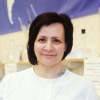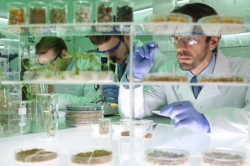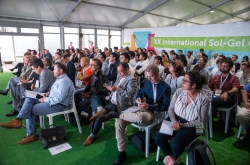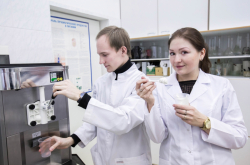Biosystems Engineering is an annual Baltic region conference in fields related to traditional and modern engineering technology and technical solutions applied in biological systems. The purpose of the BSE 2018 is to encourage scientists from all over the world to present the latest advances in the field of biosystems engineering, as well as to create an environment for sharing ideas and information. Among the participating countries are Estonia, Russia, Latvia, Finland, Sweden, Austria, Germany, Denmark, the UK, the US, and others. 170 scientists from all over the world took part in BSE 2018.

Eight speakers from different countries presented their research in the Food Science section. ITMO University was represented by scientists from the School of Biotechnology and Cryogenic Systems. Daria Kuznetsova, a PhD student at the Department of Applied Biotechnology, together with her scientific adviser Ludmila Nadtochiy presented their research on the production of chia seed oil. Their research focuses on the most efficient methods of oil extraction. The resulting oil is assessed in terms of its quality, as it depends highly on its fatty acid composition. Among the scientists’ further plans is to use the resulting oil to enrich functional foods.

“We were asked many questions, including some very tricky ones. For example, people asked us about how we’re going to afford such a project, as chia seeds are very expensive. We understand that we’ll probably have to use imported ingredients, but we’re currently working with the Omsk State Agrarian University on conducting a trial experiment on growing chia seeds in Russia”, comments Daria Kuznetsova.
The research is supported by the Biotechnologies of the Third Millennium International Research Center. At this stage, the main task is to find out the most efficient oil extraction method. Earlier research indicated that omega-3 fatty acids in chia seed oil can be used in prevention of neurodegenerative diseases such as Alzheimer's disease. The research is conducted in collaboration with scientists from the University of Lorraine (France). Daria Kuznetsova is the winner of the Eiffel Excellence Scholarship Program; this autumn, she will go to France to continue her research there.

In the poster section, PhD students from ITMO University presented three research projects on different topics. Margarita Lugova, a PhD student at the Department of Applied Biotechnology, presented a report on the creation of a frozen dessert with sesame flavoring for diabetics. Ms. Lugova proposes replacing sugar with natural sweeteners, such as girasol and stevioside extract. The purpose of her research is to create a product that could be used as a preventive medicine. In 2017, this project was awarded a grant by the Government of St. Petersburg.
Aian Orazov, a PhD student at the Department of Applied Biotechnology, presented his research on the microflora of a fermented milk beverage called shubat. Shubat is a traditional Kazakh beverage of fermented camel milk, although it can also be found in other countries. The research focuses mainly on shubat’s sanitary and hygienic characteristics.

“As it turned out, shubat made in Kazakhstan is usually obtained through spontaneous fermentation without thermal treatment, and has both beneficial and harmful microflora. We have studied lactic acid bacteria and yeast in detail, as shubat is a product of mixed fermentation, and found out that it contains yeast, which is also present in wine. We plan to create a fermenting agent for application in biotechnology”, shares Ludmila Nadtochiy, an associate professor at the Department of Applied Biotechnology and Aian Orazov’s scientific adviser.
Vera Vokueva, a PhD student at the Department of Meat and Fish Processing and Refrigeration, presented her research on meat safety control in accordance with HACCP methodology.

“Not all Russian companies use the HACCP methodology for risks management. Meat is one of the products that are the most susceptible to various types of infection. That’s why it is very important to identify and prevent risks. This allows producers to control the product’s organoleptic properties and safety. All these are factors that affect food quality and, therefore, a product’s market performance”, says Ms. Vokueva.
Several professors from leading European universities also took part in the conference. Professor Petras Rimantas Venskutonis from Kaunas University of Technology (Lithuania) presented his research on the development of new natural functional ingredients for foods and nutraceuticals from various plant origin materials. Professor Alexander Jäger from the University of Applied Sciences of Upper Austria spoke about non-alcoholic beer’s potential as a functional food. There were also other reports on various raw ingredients, such as triticale flakes and potatoes, as well as vegetable drying technology and 3D scanning of tropical fruits.





